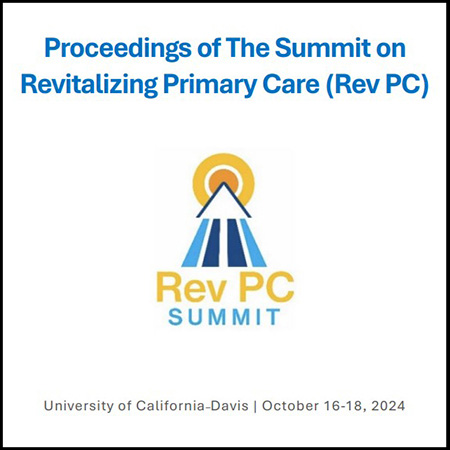New report aims to revitalize declining primary care in the U.S.
A team of 30 national experts convened by UC Davis Health offers solutions to improve patient care, diversify workforce and boost funding
Primary care in the U.S. is in decline, and a panel of national health care experts has compiled a new report outlining how to reverse course.
The recommendations, released by UC Davis Health, include care centered on the relationship between provider and patient, increased funding for primary care and modernized payment models. They also call for a larger and more diverse primary care workforce, among other recommendations.
The report summarizes the findings and suggestions of experts and thought leaders who gathered at UC Davis last October to address concerns and seek solutions to improve primary care. The report was drafted by the summit’s 30-member expert committee.

Recommendations made at last October’s Rev PC Summit are included in a 50-page report released by UC Davis Health.
The experts were among an audience of more than 100 stakeholders who met to discuss what they describe as a crisis in primary care medicine. The crisis stems from chronic severe underfunding of primary care, and inattention to health care policy and workforce planning efforts. As a result, there’s a worsening shortage of primary care clinicians. This means more and more people can’t access their internists, pediatricians or family medicine doctors, or get timely appointments that don’t feel short and rushed.
Primary care’s degradation is prompting the U.S. to fall further behind in key health indicators, the experts stated.
“We in the U.S. like to tell ourselves that we have the best health care in the world,” said Anthony Jerant, professor and chair of the UC Davis Department of Family and Community Medicine, and a summit organizer. “Yet for most leading health indicators including life expectancy, the U.S. lags farther and farther behind other developed countries, all of whom invest more resources in primary care.”

About 100 people attended the Rev PC Summit to discuss how to reverse the decline of primary care in the U.S.
Rev PC, the short name given to the summit, was hosted by the Department of Family and Community Medicine and the Center for Healthcare Policy and Research.
“This report is an important step towards addressing the primary care crisis by stimulating a national conversation around our recommendations,” Jerant said.
The 50-page report made seven recommendations to improve the state of primary care:
- Double the average proportion of health care dollars that public and private insurers spend on primary care.
- Reform payment models to encourage primary care clinicians and practices to enhance relationship-centered care.
- Modernize the delivery of high-quality care, which will reduce reporting burdens on medical practices.

Some who attended the Rev PC Summit displayed posters showing their contributions to best practices in primary care.
- Advance health equity by establishing universal population health goals pursued through a range of approaches and developed collaboratively with different communities.
- Ensure that medical schools educate and train an appropriately large and diverse primary care clinician workforce.
- Expand primary care research to learn more about the key issues affecting primary care and its much-needed reforms.
- Develop coalitions with key stakeholders involved in various aspects of primary care delivery — from patients to health plans to government agencies — to help communicate the value of robust primary care.
“We hope our recommendations are adopted by policymakers, health systems, health plans, clinicians, and others who can help revitalize primary care across the country,” Jerant said.
The report is available on the Rev PC website.




